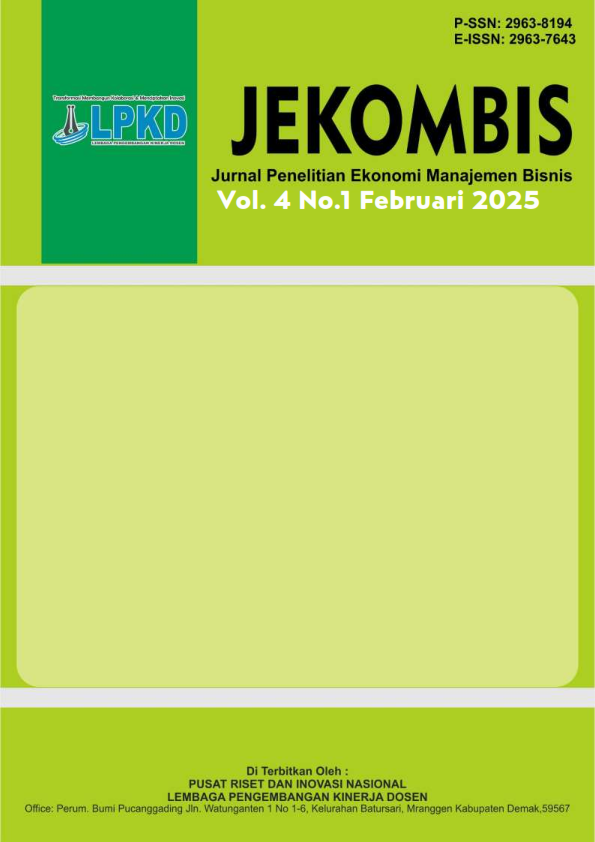Komitmen Karyawan pada Penggabungan Organisasi Perguruan Tinggi
DOI:
https://doi.org/10.55606/jekombis.v4i1.4799Keywords:
Quality, Higher, Education, Organization, CommitmenAbstract
Organizational commitment in higher education institutions plays an important role in improving the quality of education. The demands and needs of society for the quality of education are aligned with organizational commitment. On the other hand, the merger of universities is also a strategic step in improving the quality of education. At this point, the merger of organizations can influence the work commitment of its employees, with various moderating factors. This study aims to describe how organizational commitment is, especially on post-merger period. By using 5 dimensions of organizational commitment, the differences in commitment in each group are tested quantitatively. Of the five dimensions of organizational commitment, namely: affective commitment, ongoing commitment (active), ongoing commitment (passive), normative commitment, and value commitment, there are significant differences in ongoing commitment (active) and values. The implication of this finding is that there is no common orientation towards career and shared values after the merger.
Downloads
References
Adiawaty, S., Moeins, P. D. A., & Sunaryo, D. W. (2024). Comparative study of organizational commitment among Generation X and Generation Y through analysis of differences in the influence of empowerment and value. Journal of Entrepreneurship, 3(January), 121–141. https://doi.org/10.56943/joe.v3i1.498
Amtu, O., Aralaha, R., Pattiruhu, C. M., & Makulua. (2021). Creating higher education quality through leadership, organizational culture and organizational commitment. IOP Conference Series: Earth and Environmental Science, 747(1), 12037. https://doi.org/10.1088/1755-1315/747/1/012037
Brinck, K. L., Moll, T., & Siebert, W. (2023). Altruistic work values' relevance for organizational commitment in Germany. Management Revue - Socio-Economic Studies, 43(3), 277–304. https://doi.org/10.5771/0935-9915-2023-3-277
Chigeda, F., Ndofirepi, T. M., & Steyn, R. (2022). Continuance in organizational commitment: The role of emotional intelligence, work-life balance support, and work-related stress. Global Business and Organizational Excellence, 42(1), 22–38. https://doi.org/10.1002/joe.22172
Fauziah, S. (2016). Uji validitas konstruk instrumen Organizational Commitment Questionnaire (OCQ) dengan metode Confirmatory Factor Analysis (CFA). Jurnal Pengukuran Psikologi Dan Pendidikan Indonesia, 5(1). https://doi.org/10.15408/jp3i.v5i1.9244
Firmansyah, D. D. (2022). Teknik pengambilan sampel umum dalam metodologi penelitian: Literature review. Jurnal Ilmiah Pendidikan Holistik, 1(2), 85–114. https://doi.org/10.55927
Hadiyani, M. I. (2024). Komitmen organisasi ditinjau dari masa kerja karyawan. Cognicia, 1(1). https://doi.org/10.22219/cognicia.v1i1.1452
Halis, M., & Halis, M. (2021). The relationship between organizational culture and organizational commitment: A research in private health institutions. In G. Sarı (Ed.), Handbook of research on representing health and medicine in modern media (pp. 308–329). IGI Global Scientific Publishing.
Handoko, Y. (2013). Budaya organisasi, kepuasan kerja, komitmen organisasional, pengaruhnya terhadap kinerja dosen (Studi: Perguruan tinggi swasta hasil merger di Jawa Timur pada tahun 2013) [Universitas Brawijaya]. http://repository.ub.ac.id/id/eprint/161324
Harrison, R., Chauhan, A., Minbashian, A., McMullan, R., & Schwarz, G. (2022). Is gaining affective commitment the missing strategy for successful change management in healthcare? J Healthc Leadersh, 14, 1–4. https://doi.org/10.2147/JHL.S347987
Herrera, J., & De Las Heras-Rosas, C. (2021). The organizational commitment in the company and its relationship with the psychological contract. Frontiers in Psychology, 11(January), 1–17. https://doi.org/10.3389/fpsyg.2020.609211
Kawaibi, F., Junaedi, D., & Salistia, F. (2023). Peran keadilan distributif, keadilan prosedural dan keadilan interaksional terhadap komitmen afektif karyawan PT G&N Woods Craftindo. Reslaj: Religion Education Social Laa Roiba Journal, 5(5), 2957–2967. https://doi.org/10.47467/reslaj.v5i5.1602
Khairudin, K. (2021). Komitmen organisasi ditinjau dari masa kerja. Jurnal Social Library, 1(2). https://doi.org/10.51849/sl.v1i2.31
Krajcsák, Z. (2018). Making high committed workplaces by strong organizational values. Journal of Human Values, 24(2), 127–137. https://doi.org/10.1177/0971685818764064
Kurniadi, R., Arpizal, A. D., Fajarsari, A. D., & Yaldi, D. M. (2023). Strategi optimalisasi capaiian IKU 5 Universitas Jambi. Anterior Jurnal, 22(1), 106–110. https://doi.org/10.33084/anterior
Li, K. S., Tong, C., & Wong, A. (2014). The impact of career development on employee commitment of part-time faculty (PTF) in Hong Kong’s continuing professional development (CPD) sector. British Journal of Education, Society & Behavioural Science, 4(1), 52–73.
Maranata, B. H., Widyaningtyas, D. P., & Nur Istiqomah, A. (2022). Pengaruh komitmen organisasi terhadap kinerja karyawan pada PT. Bank BUMN Kota. Jurnal Arimbi (Applied Research in Management and Business), 2(2), 1–10.
Meyer, J. P., & Allen, N. (1990). The measurement and antecedents of affective, continuance and normative commitment to the organization. Journal of Occupational Psychology, 63, 1–18. https://doi.org/10.4324/9781351121149-6
Muafi. (2018). Antecedents and consequences of work satisfaction and organizational commitment in the merger process. EKUITAS (Jurnal Ekonomi Dan Keuangan), 18(1). https://doi.org/10.24034/J25485024.Y2014.V18.I1.98
Ndambuki, S. M., Kilungu, M., Sasaka, P., & Ibea, M. (2023). Influence of active continuance commitment on turnover intentions among health professionals of national referral hospitals in Kenya. Strategic Journal of Business & Change Management, 10(1), 355–366. https://doi.org/10.61426/sjbcm.v10i1.2543
Owan, V. J. (2021). Predictive path modelling of indicators of secondary school instructors' affective, continuance and normative job commitment. Journal of International Cooperation and Development, 4(2), 86. https://doi.org/10.36941/jicd-2021-0015
Ribeiro, N., Nguyen, T., Duarte, A. P., Torres de Oliveira, R., & Faustiono, C. (2021). How managerial coaching promotes employees' affective commitment and individual. International Journal of Productivity and Performance Management, 70(6), 2163–2181. https://doi.org/10.1108/ijppm-10-2018-0373
Sarhana, N., Harb, A., Shrafat, F., & Alhusban, M. (2020). The effect of organizational culture on organizational commitment: Evidence from hotel industry. Management Science Letters, 10, 183–196. https://doi.org/10.5267/J.MSL.2019.8.004
Serfiyani, C. Y. (2020). Restrukturisasi perguruan tinggi swasta sebagai upaya penyehatan dan peningkatan kualitas institusi. Jurnal Hukum Ius Quia Iustum, 27(2), 410–433. https://doi.org/10.20885/iustum.vol27.iss2.art10
Soontornchaiya, P., & Charoensukmongkol, P. (2024). Interaction effect of management communication and workplace formalization on shared goals and commitment of employees during post-merger and acquisition integration. International Journal of Business Communication. https://doi.org/10.1177/23294884241235661
Syahbana, B. N., & Septyarini, E. (2021). Peran mediasi kepuasan kerja pada pengaruh keadilan distributif dan keadilan prosedural terhadap komitmen afektif. Jurnal Manajemen, 11(2), 112–129. https://doi.org/10.30656/jm.v11i2.3017
Thi Bich, V., & Huong, T. T. M. (2019). Organizational commitment among employees in post-merger enterprises: A case study in Vietnam. VNU Journal of Science: Economics and Business, 35(5E), 51–59. https://doi.org/10.25073/2588-1108/vnueab.4296
Trikusumaadi, S. K. (2024). Pemetaan budaya organisasi pada penggabungan perguruan tinggi di bawah satu yayasan. Jurnal Ekonomi Dan Bisnis, 3(1), 271–283. https://doi.org/10.55606/jekombis.v3i1.3429
Wang, Y. (2007). Observations on the organizational commitment of Chinese employees: Comparative studies of state-owned enterprises and foreign-invested enterprises. The International Journal of Human Resource Management, 15(4–5), 649–669. https://doi.org/10.1080/0958519042000192889
Yusuf, M. R., & Syarif, D. (2017). Komitmen organisasi: Definisi, dipengaruhi, dan mempengaruhi (1st ed.). Penerbit Nas Media Pustaka.
Zakiy, M., Kinasih, P., & As’ad, S. (2023). Organizational changes and the impact on the performance of Sharia bank employees through affective. Jurnal Ekonomi Dan Bisnis Islam (Journal of Islamic Economics and Business). https://doi.org/10.20473/jebis.v9i1.34743
Zaman, T. (2021). An efficient exponential estimator of the mean under stratified random sampling. An International Journal of Mathematical Demography, 28(2), 104–121. https://doi.org/10.1080/08898480.2020.1767420
Zhu, D., Kim, P. B., & Park, I.-J. (2020). A meta-analysis of the antecedents of career commitment. Journal of Career Assessment, 29(3), 502–524. https://doi.org/10.1177/1069072720956983
Zhu, D., Kim, P. B., Milne, S., & Park, I.-J. (2024). How does the career commitment of hospitality employees change across career stages? A multilevel investigation into occupational self-efficacy and family support. International Journal of Hospitality Management, 120, 103748. https://doi.org/10.1016/j.ijhm.2024.103748
Downloads
Published
How to Cite
Issue
Section
License
Copyright (c) 2025 Jurnal Penelitian Ekonomi Manajemen dan Bisnis

This work is licensed under a Creative Commons Attribution-ShareAlike 4.0 International License.







